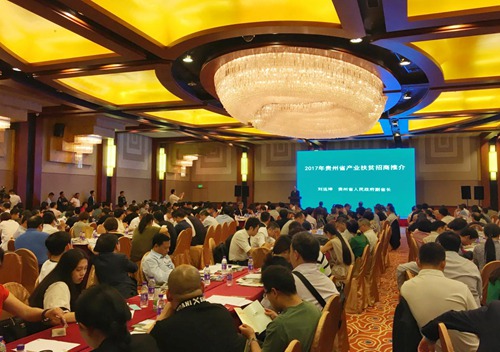
 |
|
Liu Yuankun, vice-governor of Guizhou province, is delivering a speech to guests from business, government departments, trade associations and NGOs. [Photo by Song Tingting/chinadaily.com.cn] |
On May 7, Guizhou provincial government and the Revolutionary Committee of the Chinese Kuomintang (RCCK), one of China's eight non-communist parties, successfully launched the Guizhou Industry Investment Promotion for Poverty Alleviation in Beijing, in a bid to attract more companies to set up businesses in Guizhou.
Li Huidong, secretary-general of the RCCK, and Liu Yuankun, vice-governor of Guizhou province, delivered speeches to over 400 guests from government departments, trade associations and NGOs and representatives from more than 330 companies.
Li Huidong said that the RCCK has fully supported and participated in Guizhou’s anti-poverty campaign since the 1980s. The RCCK has made great contributions to Guizhou’s social and economic development through close cooperation and unearthing potential within poor mountainous areas to achieve sustainable development.
The RCCK has been called upon to implement its democratic supervision across the nation’s poverty alleviation schemes, pairing up with Guizhou province to supervise their activities in identifying the poor, and lifting them out of poverty. Li believes that the RCCK will integrate supervision work with supportive activities to make concrete changes for locals in combating poverty.
Liu Yuankun highlighted the remarkable results yielded by efforts throughout society since Guizhou vowed to boost poverty relief. According to Liu, towns in Guizhou are no longer constrained by roads as in recent years. Instead, a comprehensive, convenient and fast transportation system has been developed, capable of transporting Guizhou products to numerous large and medium cities in China within 2 to 8 hours.
Guizhou has also capitalized on its landforms, soil resources and preferential climate conditions by planting nearly 7 million mu of tea, 7 million mu of chili, 7 billion mu of barley rice and 1 billion mu of pitaya - each ranking No 1 in China in terms of cultivation area. Apart from developing green and organic agriculture, Li also introduced Guizhou’s focus on medicinal herbs, planting 5.4 million mu of artificial cultivation and wild-planting areas, ranked No 3 in the country.
Guizhou plans to transform its abundant natural resource advantages into an industrial edge. Liu Yuankun concluded with the promise that Guizhou will continue to “create a pro-business, cordial, secure and protective environment”.
Edited by Charlie Clarkson